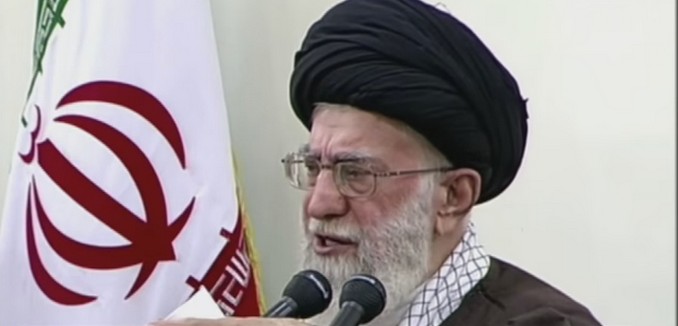In an apparent reaction to Iran’s increasing isolation from the Arab world, Iranian Supreme Leader Ayatollah Ali Khamenei called the growing ties between Israel and Saudi Arabia a “stab in the back” of the Muslim world, Iranian media reported on Monday.
Revelation of Saudi government’s relations with Zionist regime was stab in the back of Islamic Ummah.
— Khamenei.ir (@khamenei_ir) August 1, 2016
Khamenei, who accused the United States of creating or intensifying problems in the Middle East, also blamed it for the rapprochement between Israel and Saudi Arabia. “The Saudi government is follower, possessed by and subservient to the American government,” he claimed.
Public conversations between Israeli and Saudi figures, likely spurred by the common threat both nations face from Iran, have been increasingly frequent and visible in recent months. Last week, a delegation of Saudi academics and business people led by former general Anwar Eshki met with Israeli Foreign Ministry Director-General Dore Gold, opposition Knesset members, and the IDF’s coordinator of government activities in the territories.
Yaakov Amidror, Israel’s former national security advisor, also engaged in a public discussion on regional issues with former Saudi intelligence chief Prince Turki al-Faisal in Washington in May. Although the two former officials differed on the Mideast peace process, both emphasized the threat posed by Iran. That same month, officials from Israel and Saudi Arabia revealed that representatives from their countries had been engaging in secret meetings since 2014 to discuss Iran’s threat to the region. At an event hosted by the Council on Foreign Relations in June 2015, Eshki and Gold discussed their shared concern about Iran’s pursuit of nuclear weapons and its regional aggression. And in May 2014, Faisal met with Israel’s former head of military intelligence Amos Yadlin at Israel’s Institute for National Security Studies.
In his Monday speech, Khamenei also claimed the nuclear deal “as an experience, once again proved the futility of negotiations with the Americans, their lack of commitment to their promises and the necessity of distrust of US pledges,” despite the fact that the U.S. already released billions in frozen Iranian assets, in accordance with the agreement. Khamenei further complained that the U.S. is damaging Iran’s economic prospects, even though the country’s economy is expected to grow by 4 percent a year for the next five years as a result of nuclear-related sanctions relief, according to a June study published by the Foundation for Defense of Democracies. Money released by the U.S. in exchange for the freedom of Americans who had been held in Iran also helped Tehran boost its military spending by 90% for next year.
Experts have indicated that restrictions on Iran’s economic relations are not the result of American interference, but internal Iranian corruption. The Basel Anti-Money Laundering Index last week ranked Iran as the highest money laundering risk in the world for the third year in a row.
Many financial sanctions were placed on Iran before nuclear sanctions were imposed as a reaction to the country’s money laundering and financing of terrorist groups. The New York Times editorial board asserted in April that Iran’s corruption was responsible for the country’s economic problems. Similarly, Stuart Levey, President Barack Obama’s former undersecretary of the treasury for terrorism and financial intelligence and now the chief legal officer of HSBC Bank, wrote in The Wall Street Journal in May that because Iran remained a risk for “financial-crime risks and the underlying conduct,” his company had “no intention of doing any new business involving Iran.” The Journal, CNBC, and other outlets reported a few days later that other European banks were hesitant to do business with Iran because of the risks involved.
An International Monetary Fund official also told Iranian authorities in May that “the best thing the government [of Iran] can do, and the banks can do, is to bring those standards up to international levels and try to reassure foreign partners, banks and otherwise that Iran’s banks are safe to deal with.”
[Photo: PressTV News Videos / YouTube ]




